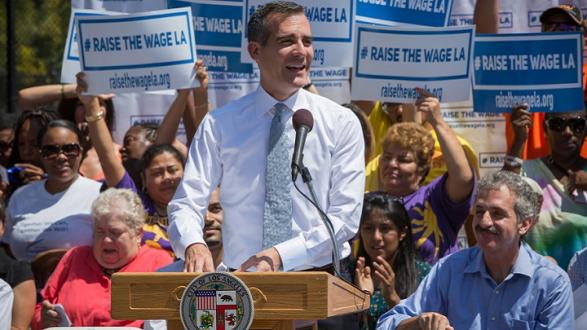In:
On Wednesday, Los Angeles became the largest city in the nation to raise the minimum wage to $15 an hour from $9. The measure adopted by the L.A. City Council – by a vote of 13 to 1 – will increase the wages of nearly half the city’s total workforce by 2020. The ordinance also calls for the minimum wage in 2022 to continue increasing based on the cost of living.
The Los Angeles Times said that the move represents “a trend sweeping cities across the country as elected leaders seek to boost stagnating pay for workers on the lowest rungs of the socio-economic ladder.” The New York Times called L.A.’s ordinance “perhaps the most significant victory so far for labor groups and their allies who are engaged in a national push to raise the minimum wage.”
“Los Angeles, the second biggest city in the nation, is leading the nation,” said LA City Councilman Paul Kerkorian.
In short: it’s a huge deal.
Los Angeles is larger than both San Francisco and Seattle – the only two other $15 minimum wage cities – combined. The planned wage hike will assist roughly 750,000 Angelenos, an impressive 46 percent of the city’s workforce. In a city where homelessness has spiked 12 percent over the last two years and where the rental market is the worst in the nation, many L.A. leaders say that raising the minimum wage to $15 is a necessity.
“The minimum wage shouldn’t be a poverty wage. Angelenos working full time should be able to afford to live in our amazing city,” remarked Mayor Eric Garcetti.
Not everyone in Los Angeles is happy about the proposed increase in pay. Rueben Gonzalez of the Los Angeles Area Chamber of Commerce argued: “There is simply not enough room, enough margin in these businesses to absorb a 50-plus percent increase in labor costs over a short period of time.”
That would mean layoffs of the very people the wage increase seeks to help, or worse, businesses choosing to relocate outside of the city.
Will other cities follow L.A.’s example? Holly Sklar, chief executive of Business for a Fair Minimum Wage, thinks so. “This ratchets up pressure in these cities,” Sklar said. “As more states and cities do this, it only adds pressure on the federal government.”
Indeed, immediately following L.A.’s wage hike proposal, New York City Mayor Bill de Blasio announced his own intent to raise the city’s hourly pay to $15, and the pressure is on Gov. Andrew M. Cuomo to reject any increase that falls short of $15.
How the minimum wage experiment in L.A. will affect the Fight for 15 movement nationwide and globally remains to be seen. The second largest city in the United States just took a big step to help hundreds of thousands of people escape the pitfalls of poverty: the world will be watching to see if it works.
____________________
Photo credit: Flickr user Eric Garcetti




